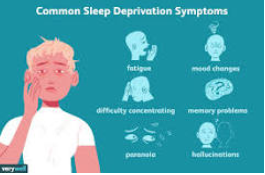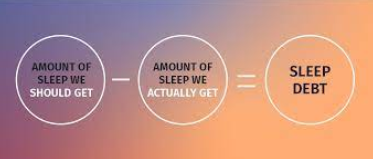As teenagers, we often sacrifice our sleep. Whether it be to get some extra study time, watch a TV show, or hang out with friends, the amount of sleep we get is rarely a top priority. However, due to sleep debt, teenagers don’t realize this lack of sleep is actually causing detrimental effects on our brains and bodies.
So what is sleep debt? According to Web Md, “Sleep debt, also known as sleep deficit, is the difference between how much sleep you need and how much you actually get. When you sleep fewer hours than your body needs, you have a sleep debt”. When a sleep debt continues to occur over long periods of time it can have long-term effects on an individual’s health. Furthermore, sleep debt is cumulative, meaning the less sleep you get the more sleep debt you have. The average amount of sleep an individual should get is 7 or more hours a night. So let’s say you get 5 hours of sleep a night for a whole week, that would mean you have 14 hours of sleep debt for that week alone.
What effects does sleep debt have on your health? Not only does sleep debt lead you to being fatigued throughout the day it can also have detrimental effects physically and mentally. According to the National Library of Medicine, “There are around 90 distinct sleep disorders; most are marked by one of these symptoms: excessive daytime sleepiness, difficulty initiating or maintaining sleep, and abnormal events occurring during sleep. The cumulative long-term effects of sleep loss and sleep disorders have been associated with a wide range of deleterious health consequences including an increased risk of hypertension, diabetes, obesity, depression, heart attack, and stroke”. Continually, a lack of sleep can lead to an increase in mental health issues; effects of constant irritability, depressive mood swings, anxiety, paranoia, suicidal thoughts, and substance addiction.

Now these side effects may seem extreme, however, when sleep debt accumulates over time it can detrimentally affect your health in one or many of these ways. Although the average sleep an individual should get is 7 hours a night teenagers need 9 as their brains are still developing. According to the American Chemical Society, “studies indicate that lack of sleep leads to neurological damage in the hippocampus, a part of the brain involved in learning and memory”. So when looking at a school environment, “Researchers at McGill University and the Douglas Mental Health University Institute in Montreal found that children who had a better quality sleep performed better in math and languages”. Outside of school, those who can maintain a lack of sleep debt often perform better in sports and are more likely to maintain strong social relationships.

As a teenager who struggles with getting in 9 hours of sleep daily and constantly acquires more and more sleep debt, these effects instantly caused me to want to develop a more healthy sleep schedule. From multiple sources, I was able to learn many tips and tricks that have helped me work towards a better sleep schedule. The main thing that has helped me personally is to create a nightly routine, especially for school nights. Your brain thrives when it has a routine and having a consistent routine at night allows your brain time to wind down and recognize it’s time to go to sleep. Another common tip online is to listen to peaceful music such as white noise. Try a couple of noises (white, ocean, etc.) once a night to see if one works effectively for you. After interviewing students and teachers I have found that everyone is different so one person’s solution might not work for you. Some people enjoy, “changing positions in your bed or lying in a new spot,” or “tensing up every muscle one at a time bottom to top”. The most common and effective method students interviewed said was putting your phone down. Whether it be that they force themselves to put their phone down or their parents take their phone it seems to help people fall asleep faster. By turning off your phone you are causing your brain to be less simulated leading you to get tired faster. There also are other methods such as the 7,8,4 method which may also help (where you breathe in for 7 seconds hold for 8 seconds and breathe out for 4).

No matter what method you try it is important to find one that is effective and you can follow consistently. It is common that when you first attempt to develop a healthy sleep schedule it won’t seem to work well. The most important thing is that when you find a method, know consistency is key–it takes 21 days to train your brain to follow a routine. To see results and help decrease sleep debt in the future start developing a routine now so that in the new year you will be a completely changed sleeper. Don’t let sleep debt accumulate anymore and change your habits now!
Sources:
https://www.webmd.com/sleep-disorders/what-is-sleep-debt
https://www.ncbi.nlm.nih.gov/books/NBK19961/
https://www.betterhealth.vic.gov.au/health/conditionsandtreatments/sleep-deprivation









